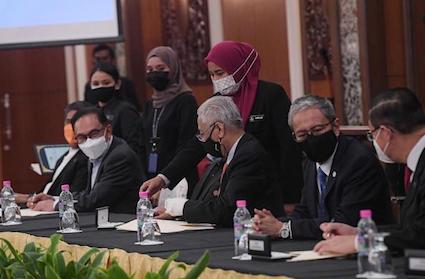Roti, egg or MOU?

“The political elite is telling us if they stop fighting, things will be ok. But it is the politicians’ own doing (that they are fighting).”
Philip Golingai, The Star
WHICH concerns you – the price of roti kaya and half-boiled egg or two-term limit for the prime minister?
For most everyday Malaysians, political research firm Ilham Centre’s Prof Hamidin Abdul Hamid noted that they were concerned about the bread-and-butter issue and not the recently signed memorandum of understanding (MOU) on bipartisan political cooperation.
On Friday, I had coffee with Prof Hamidin in Bangsar, Kuala Lumpur to discuss the mood on the ground on the MOU. The Datuk Seri Ismail Sabri Yaakob government and Pakatan Harapan agreed for a political ceasefire to allow the country to focus on the impact of Covid-19. The MOU also stated the implementation of an anti-party hopping bill and limiting the prime minister’s term to 10 years.
We also discussed Ilham’s survey “Institutional Reform in Malaysia: Malay Muslims Views and Sentiment” which found that the Malay community prioritised social and economic issues such as poverty and cost of living over matters like institutional reform.
Prof Hamidin explained that the institutional reform agenda lacked traction among the Malays because the community doesn’t see how it directly affected their lives.
“I think that this (misinformation issue) must be fixed immediately because the Malay community wants to see how the reform agenda is able to put food on their table, improve their source of income, ease the process of their children’s education, and increase their employment opportunities,” he said in a press conference as reported in the media.
The professor argued that the MOU was a shiok sendiri (self-indulgence) political agreement.
“How on earth the MOU can fight Covid-19. The seven things on the MOU, how can they directly involve fighting the pandemic and economy. Zero,” he told me.
He contended that the politicians were discussing issues that the people were not that much concerned. The rakyat, he said, was more worried about their livelihood, which is affected by the Covid-19 pandemic.
Malaysians, Prof Hamidin noted, was menyampah (“fed up” or “don’t like”) with politicians. “The problem is the politicians are thinking of the survival of their party and not of the people. Meaning they are thinking of their political survival,” he said.
Playing the devil’s advocate, I told the professor that having political stability which the MOU achieved would help the government focus on the pandemic which has impacted our economy and health.
“Perhaps, previously we could not do it as there were too many political games played. So now we have more political stability and the government can focus on tackling the economy and health issues,” I said.
“Yes, I do not deny that,” Prof Hamidin said.
“But, I am looking from a different angle. Does the ceasefire bring a new economic policy? None. Does Pakatan Harapan bring anything new with the MOU? Zero,” he said.
“The political elite is telling us if they stop fighting, things will be ok. But it is the politicians’ own doing (that they are fighting).”
In the Ilham survey conducted for two months from April to June this year, Prof Hamidin said the think tank found that Malaysians were frustrated that whatever policies the government announced did not trickle down to the rakyat.
“There was a big gap between Putrajaya and just say Kulai. When the government made RM4bil or RM6bil announcements, the people did not feel it except for the cash handouts,” he said.
The mood on the ground is anger, according to Prof Hamidin. The rakyat wants to punish the politicians – whether with the government or Pakatan, he said.
“They are suffering economically and socially and they reach a level where they are disgusted with politicians,” he said.
Later that night, I had a phone conversation with a pollster who did an online survey on Malaysians’ perception of the MOU.
The pollster, who did not want to be identified as the survey finding has not been publicly released, said respondents across the board were confident that the political ceasefire would help the government to tackle the economic challenges caused by the pandemic. Roughly, he said that 75% of Malaysians said yes, 10% said no, while 15% were undecided.
“The result indicates that Malaysians want political stability as they are concerned about the bread-and-butter issue as we have been under lockdown for a long time. They want some semblance of stability so that the government can make long term decisions,” he said.
The pollster pointed out that Malaysians were concerned about their livelihood and wanted political stability as they were tired of politics. “They feel that bipartisan politics is the right direction,” he said.
The online survey also asked if the MOU would bring political stability to the country. The result was one-third for yes, no and undecided. “This shows that the people are confused. They are not sure what will happen politically,” he said.
Most of the rakyat are more concerned about the price of roti kaya and half-boiled egg than the two-term limit for the prime minister. Perhaps, when you have enough food in your stomach, you can start worrying about how long a PM should stay in the office.

